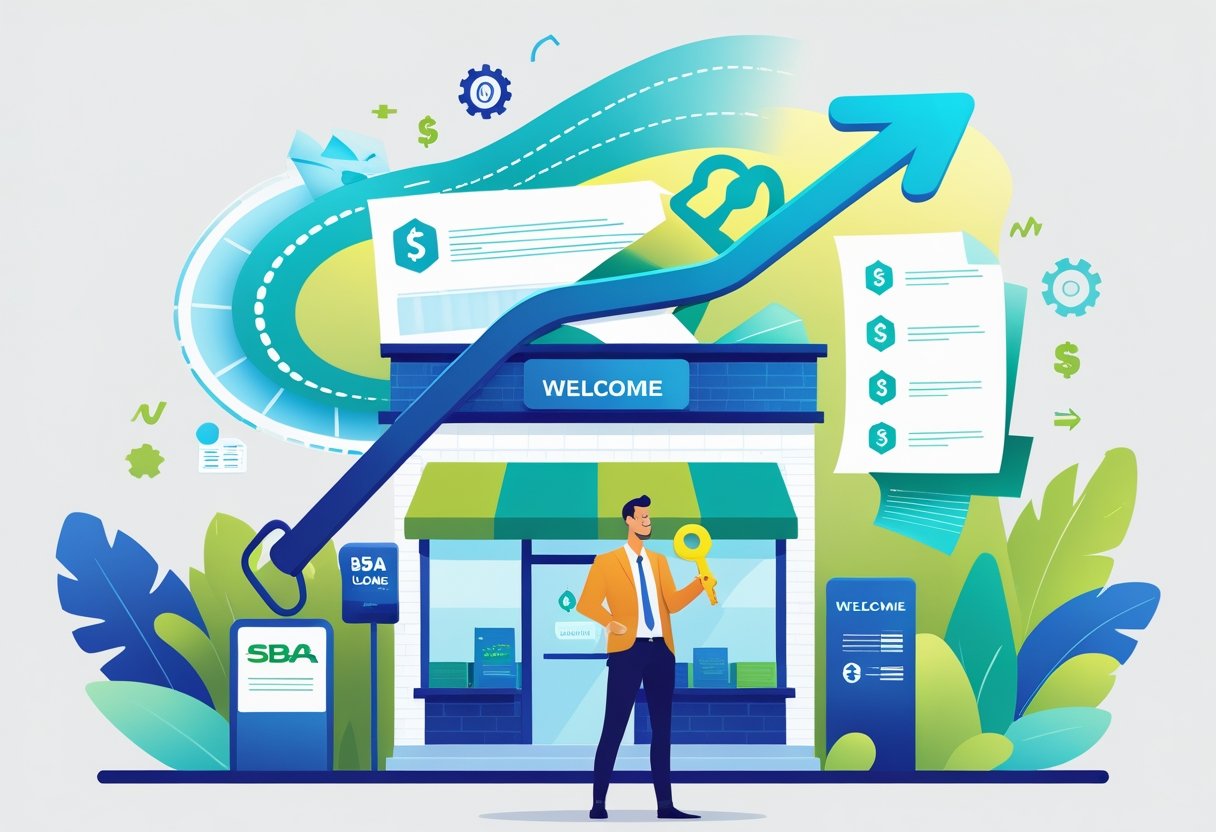
Government Loans for Opening a Restaurant: Essential Funding Options
Opening a restaurant can be an exciting venture, but securing the necessary funding often feels daunting. Government loans, particularly those offered by the SBA, provide a crucial resource for obtaining the capital you need to turn your culinary dreams into reality. These loans are designed to support small businesses, making them accessible for budding restaurateurs looking to establish or expand their operations.
Navigating the landscape of government loans can be overwhelming, but platforms like SBA Central simplify the process. As the #1 SBA Resource Library on the Internet, we offer a comprehensive array of tools and information, ensuring you have everything you need at your fingertips. With our services, including staffing solutions and consulting expertise, you are equipped to tackle the various challenges of funding your restaurant.
Whether you're planning a cozy café or a bustling bistro, understanding the options available through government loans is essential. By leveraging the resources at SBA Central, you can approach your financing journey with confidence and clarity, ensuring that you set the stage for success in the competitive restaurant industry.
Understanding Government Loans for Restaurants
Government loans can be a crucial resource for opening and sustaining your restaurant business. Specifically, the U.S. Small Business Administration (SBA) provides various financing options designed to address the unique needs of restaurants.
The Role of the Small Business Administration
The U.S. Small Business Administration plays a pivotal role in supporting small businesses, including restaurants. It offers programs that facilitate access to funds, ensuring you have the financial backing needed for startup costs, renovations, and operational expenses.
The SBA does not lend money directly but guarantees a portion of loans made by banks and other lenders. This decreases the risk for lenders, which can lead to more favorable terms for you, such as lower interest rates and longer repayment periods.
Utilizing SBA resources can give you an edge, providing you with necessary tools and information about applying for loans. For comprehensive information, visit sba.gov.
Types of SBA Loans and Restaurant Financing
The SBA offers several loan programs that cater specifically to restaurant owners. Among them, the 7(a) Loan Program is one of the most popular options. It can be used for various purposes, including purchasing equipment, securing real estate, and covering working capital needs.
Another option is the CDC/504 Loan Program, which helps finance major fixed assets like property or large equipment.
When pursuing these loans, it’s critical to outline your business plan clearly, illustrating your restaurant's potential profitability. Additionally, agencies like SBA Central provide valuable guidance and resources for navigating the application process, making it easier for you to secure the necessary funds.
Utilizing the resources available through SBA Central can enhance your chances of success, as they combine expertise and consulting solutions tailored to your financing needs.
Eligibility and Application Process
Understanding eligibility and navigating the application process are crucial for securing government loans for your restaurant. This section provides detailed guidance on determining your eligibility, navigating the application portal, and preparing documents required for your loan application.
Determining Your Eligibility
To qualify for an SBA loan, you must meet specific eligibility criteria. Generally, your business should be a for-profit entity operating in the United States, and you must demonstrate a need for the funds.
Key eligibility requirements include:
- Credit Score: Typically, a personal credit score of at least 650 is preferred.
- Time in Business: Most programs require applicants to be in business for at least two years, although newer ventures may also qualify under certain conditions.
- Financial Stability: You will need to present financial statements, such as profit and loss statements for the last two years, to show your ability to repay the loan.
Understanding these criteria is essential to avoid lengthy application processes without qualification.
Navigating the Application Portal
The application process begins at sba.gov/restaurants. You will need to create an account on the SBA Central portal to start your application.
The steps include:
- Account Creation: Register with your email and create a secure password.
- Application Form: Complete the online form, which will require personal and business information.
- Submission: After filling out the form, you can electronically submit it and track its status.
Familiarize yourself with the portal's features to ensure a smooth application experience.
Application Requirements and Documentation
Gathering the necessary documentation is a critical step. You will need to present several key documents, including:
- Tax Returns: Provide personal and business tax returns for the past three years.
- Bank Statements: Submit your bank statements for the last 12 months to demonstrate cash flow.
- Financial Projections: Include a detailed forecast of your finances for the next year to showcase your plans for growth.
Being prepared with the right documents will expedite your application process. At SBA Central, you can access resources and support for creating these documents effectively.
Financial Considerations
When opening a restaurant, understanding financial considerations is crucial. This includes assessing your cash flow needs, understanding interest rates and loan terms, and knowing collateral and equity requirements. Each of these elements plays a significant role in securing funding and ensuring business success.
Assessing Cash Flow and Capital Needs
Evaluating your cash flow is essential for determining how much capital you will need. Start by projecting your monthly expenses, including rent, utilities, payroll, and supplies.
Consider your working capital requirements to maintain smooth operations. You should account for initial costs during the startup phase and plan for ongoing expenses, ensuring you have enough to cover at least three to six months of operating expenses.
Calculate your expected revenue based on your market research. This will help create a realistic budget and identify any funding gaps that may need addressing through loans.
Interest Rates and Loan Terms
Interest rates directly affect the total cost of your loan. Research current market rates, which can vary based on your creditworthiness and the type of financing you seek. SBA loans, for example, typically offer lower interest rates compared to conventional bank loans.
Understand the terms associated with different loans, such as repayment periods, which can range from a few years to several decades. Pay attention to whether the loan is fixed or variable; fixed rates provide predictability while variable rates may change over time.
Evaluate the total cost of borrowing, including any fees and charges, to ensure that you pick the most beneficial option for your restaurant.
Understanding Collateral and Equity Requirements
Many lenders require collateral to secure a loan, which reduces their risk. This could include real estate, equipment, or inventory. Knowing the value of your assets can strengthen your loan application.
In addition, lenders often expect a certain level of equity investment from you, demonstrating your commitment to the business. Prepare to show how much of your own funds you’ve invested and how it supports your restaurant's financial health.
Consulting services from SBA Central can help you navigate these requirements effectively and find tailored financing solutions. You will find a vast array of resources that pertain specifically to SBA-related services, ensuring you are well-equipped for the financial journey ahead.
Impact of COVID-19 on Restaurant Financing
The COVID-19 pandemic has significantly altered the financial landscape for restaurants. Understanding the measures available for restaurant financing is crucial for recovery and growth. Key resources include government programs aimed at revitalizing the industry and addressing pandemic-related revenue loss.
Restaurant Revitalization Fund
The Restaurant Revitalization Fund (RRF) was established to provide direct relief to restaurants impacted by the pandemic. This fund offers grants to cover operational costs such as rent, payroll, and food supplies.
Eligible businesses can receive funding equal to their pandemic-related revenue loss, with a maximum of $10 million per restaurant or $5 million per location. Applicants need to demonstrate a significant decline in revenue due to COVID-19, ensuring assistance goes where it's most needed.
By utilizing resources through SBA Central, you can access detailed guidance on applying for these funds. This platform serves as the top SBA resource library, providing tools and expert insights necessary to navigate the process.
Pandemic-Related Revenue Loss and Recovery Options
Restaurants have faced unprecedented revenue loss during the pandemic. Many operators reported a drop in sales, leading to widespread closures and staffing reductions.
To recover, businesses can explore various financing options. This includes traditional loans, grants, and specific relief programs focused on the restaurant sector. Utilizing these options can help stabilize operations and regain economic activity.
You should thoroughly assess your financial situation to determine which avenues best align with your recovery objectives. SBA Central stands out in offering comprehensive support services for your SBA-related needs. From expert consultations to a wealth of information, it’s designed to help you succeed.
Additional Financing Options for New and Existing Restaurants
When exploring financing for your restaurant, consider various alternatives beyond government loans. Understanding these options can empower you to make informed decisions that align with your business goals.
Exploring Non-SBA Financing Alternatives
You have several non-SBA financing options available. Merchant cash advances provide quick capital that is repaid through a percentage of daily credit card sales. This can be beneficial during slow periods.
Equipment financing allows you to acquire essential machinery while spreading payments over time. This type of financing secures the equipment as collateral, often easing approval hurdles.
Additionally, consider traditional business loans, which are sometimes offered by local banks. These loans typically require a strong credit history and financial projections demonstrating repayment capability.
Crowdfunding has also gained popularity, where you can showcase your restaurant concept to potential backers. This approach not only raises funds but also builds an initial customer base.
The Landscape of Restaurant Financing in 2024
In 2024, the restaurant financing landscape is evolving. Alternative lenders are increasingly willing to work with restaurant owners, offering higher loan amounts and flexible repayment terms.
Key options you might encounter include lines of credit, which allow for easy access to funds as needed. This method offers flexibility that can be crucial in managing cash flow.
You may also find that many financing options require demonstrating detailed financial projections. Providing these forecasts showcases your ability to manage funds effectively, improving your chances of securing a loan.
It’s important to stay informed about current trends and emerging opportunities. SBA Central serves as your top resource, offering tools, information, and expert consulting to help you navigate these financing avenues and succeed in your restaurant journey.


